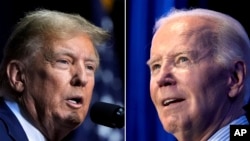Marijuana is a rare consensus issue in politically divided America, with polls showing that 88 percent of Americans support at least partially legalizing the drug. But cannabis advocates say neither of the leading presidential candidates are capitalizing on shifting attitudes.
Nearly three-quarters of Americans live in states where marijuana is legal for medicinal purposes. Half the population live where it is also allowed recreationally. But cannabis remains entirely illegal under federal law, where it is classified alongside heroin and LSD as drugs with no currently accepted medical use and a high potential for abuse.
The overwhelming majority of American voters who think that should be changed makes cannabis a ripe opportunity for presidential candidates Joe Biden and Donald Trump, especially among young voters, according to Scotty Smart, a community organizer with the civic engagement group the New Georgia Project.
“A lot of people don’t understand policy. A lot of people don’t know how policies affect their day-to-day lives. I think cannabis is an issue that ignites and excites young people to pay attention,” Smart said.
At the National Cannabis Festival and Washington policy summit earlier this month, founder Caroline Phillips said neither Biden nor Trump have delivered.
“For both of them, one thing that they have in common is that their track records on cannabis have been inconsistent and incremental. We’ve heard promises from both administrations, neither of which have panned out in full,” Phillips said.
Under Biden, the Department of Health and Human Services recommended changing marijuana to a lighter drug classification – “rescheduling” it instead of making it legal, which would be “de-scheduling.”
Phillips added, “The current White House’s policy on marijuana remains slightly unclear. They have given us great signals that they are willing to shift toward de-scheduling, but most likely rescheduling. However, we haven’t quite seen the action to back up their words.”
In 2018, then-President Trump said he would “probably” support efforts to end federal prohibitions on marijuana and leave its legality up to the states. That legislation never got out of Congress.
Trump told a Newsmax TV interviewer last year that studies show marijuana “does significant damage and yet, from a voting standpoint, it’s a pretty popular thing.”
“Trump’s track record on cannabis has been inconsistent at best. We’ve heard him both say that people who sell drugs on the illicit market should be jailed and even put to death. I think that’s some of the scarier rhetoric around that. But we’ve also seen him pardon people who’ve been locked up for cannabis,” Phillips said.
U.S. voters’ shifting attitudes about marijuana show in Gallup polling, where last year, 70 percent of adults supported legalization. That is more than double the number who said they favored legalization in 2000.
Morgan Fox, a political director for the National Organization for the Reform of Marijuana Laws said, “This is an issue that is increasingly important to voters, particularly young voters, and any candidate that wants to get ahead, whether it’s in the presidential election, in Congress or state legislatures or local legislators, if they ignore this issue, it is going to be at their peril.”
Younger voters animated by legalizing marijuana are hoping for Biden administration action on cannabis before the November election.









Forum